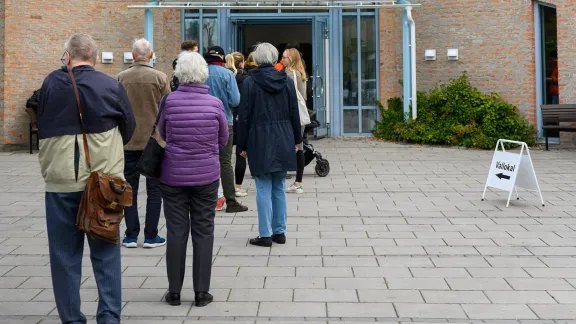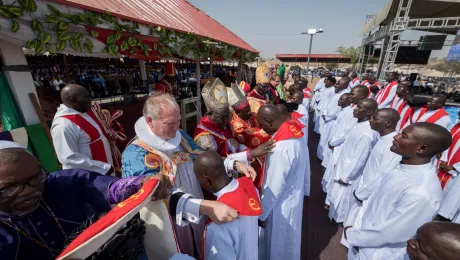
People queuing outside St. Pers Church in Uppsala, Sweden, to cast their vote in the church elections. Photo: Magnus Aronson/Ikon
Making the church election accessible for everyone
(LWI) – The Church of Sweden, a member church of The Lutheran World Federation (LWF), held its last church elections from 6 to 19 September. Having been a state church until 2000, this largest faith community in the country now conducts church elections autonomously and strives for a high level of participation among about 5 million members eligible to vote.
“This year, we saw a voter turnout of 17,4 percent,” said Jiang Millington, Church of Sweden’s communications officer for the church election. “That is slightly lower than the 2017 elections, but a distinctly higher number than elections during the 2000s. Then turnouts were 11-14 percent.”
The Church of Sweden’s inclusive approach entails providing election information in 16 languages, easy-to-read Swedish, spoken web, and sign language on the church’s website. Also, voting can take place on election day and through early voting, postal voting, and proxy voting. “It is important to provide equal possibilities for all members with voting rights in the church election,” explains Millington. “It is a question of democratic legacy.”
Another part of the legacy is nomination groups that strive for representation in the church. These are associations and interest groups formed to participate in the church elections. Anyone who wants to get involved can either join an existing group or start a new one together with others.
It is ultimately the members of the Church of Sweden who decide how the church's matter are taken care of by casting their vote for a specific nomination group.
“It is important that the Church of Sweden, as the organizer of the elections, respects the democratic process and remains neutral towards the 601 nomination groups running in the election,” Millington says.
Local, regional, and national representation
While the General Synod, consisting of 251 delegates, is the Church of Sweden governing body at the national level, elections also took place for the Diocesan Council at the regional level and Parish Assemblies at the local level. “The elections on all levels are through direct elections by eligible voters, every four years,” explains Millington.
The responsibilities of the elected members to the governing bodies at the national, diocesan, and parish levels lie with operational priorities and the budget. On the other hand, teachings and beliefs are decided by the ecclesiastical officers, namely bishops, pastors, and deacons.
“Matters concerning the beliefs, services or ecumenical relations of the Church of Sweden are deliberated by the Doctrine Commission before the General Synod can take a decision,” Millington explains. “The Doctrine Commission consists of the 14 bishops and eight additional theological experts. Therefore, it can be regarded as a guarantor against all too fast or radical changes of matters concerning the church´s internal affairs.”


